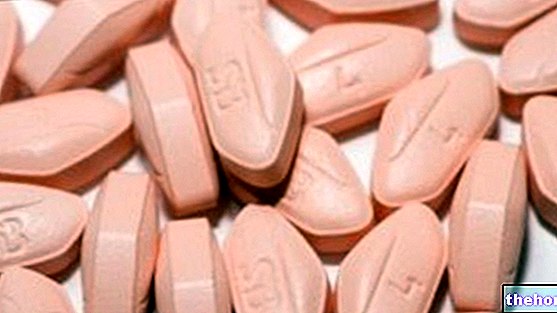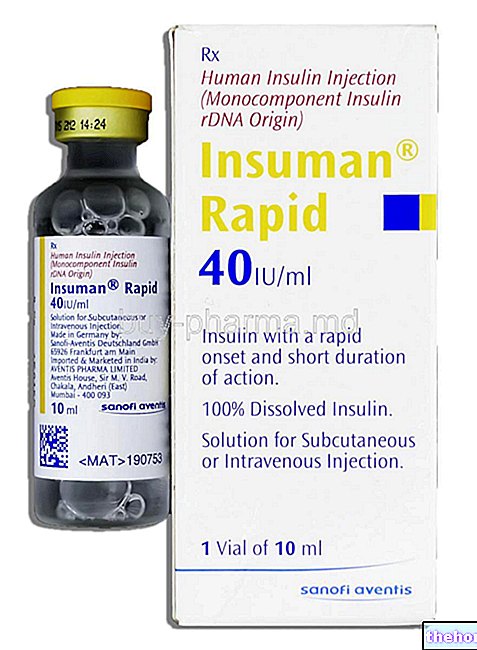GLIBOMET ® a drug based on Metformin hydrochloride and Glibenclamide.
THERAPEUTIC GROUP: Oral hypoglycemic agents, combined therapy

Indications GLIBOMET ® - Metformin + Glibenclamide
GLIBOMET ® is used as a drug therapy for type 2 diabetes mellitus, not adequately compensated by diet or sulfonylureas and biguanides.
Mechanism of action GLIBOMET ® - Metformin + Glibenclamide
The association in fixed doses of metformin and glibenclamide, which can be observed in GLIBOMET ®, guarantees good glycemic control in diabetic patients unresponsive to single therapy with sulfonylureas or biguanides, combining complementary mechanisms of action.
In fact, while glibenclamide, once absorbed in the intestine, is able to reach the pancreatic beta cell by inhibiting the potassium channel belonging to the SUR family and facilitating the depolarization of the plasma membrane with the consequent release of insulin, metformin acts at the level of insulin-sensitive tissues, facilitating the uptake of glucose on the one hand and inhibiting the endogenous synthesis of glucose on the other.
In both cases, the active ingredients taken orally and absorbed in the intestine are eliminated mainly through the urine.
Studies carried out and clinical efficacy
1. COMPARED COMBINED THERAPIES
J Diabetes Complications. 2009 Nov-Dec; 23: 376-9.
Efficacy of glimepiride / metformin combination versus glibenclamide / metformin in patients with uncontrolled type 2 diabetes mellitus.
González-Ortiz M, Guerrero-Romero JF, Violante-Ortiz R, Wacher-Rodarte N, Martínez-Abundis E, Aguilar-Salinas C, Islas-Andrade S, Arechavaleta-Granell R, González-Canudas J, Rodríguez-Morán M, Zavala-Suárez E, Ramos-Zavala MG, Metha R, Revilla-Monsalve C, Beltrán-Jaramillo TJ.
Combined metformin / glibenclamide therapy was less effective than glimepiride / metformin in reducing glycemic control by reducing glycosylated hemoglobin levels in patients with type II diabetes, not adequately compensated by individual therapies.
2. CARDIOVASCULAR RISK AND HYPOGLYCEMIC DRUGS
Eur Heart J. 2011 Apr 6.
Mortality and cardiovascular risk associated with different insulin secretagogues compared with metformin in type 2 diabetes, with or without a previous myocardial infarction: a nationwide study.
Schramm TK, Gislason GH, Vaag A, Rasmussen JN, Folke F, Hansen ML, Fosbøl EL, Køber L, Norgaard ML, Madsen M, Hansen PR, Torp-Pedersen C.
Very interesting study that tested the cardiovascular risk induced by various oral hypoglycemic drugs. The study demonstrates how insulin secretagogues such as sulfonylureas may be associated with a higher risk than for example that linked to metformin, thus underlining the importance of the side effects of these drugs on the heart.
3. SECURITY OF COMBINED PROCESSING
Drug Saf. 2004; 27: 1205-16.
Tolerability profile of metformin / glibenclamide combination tablets (Glucovance): a new treatment for the management of type 2 diabetes mellitus.
Davidson JA, Scheen AJ, Howlett HC.
The treatment of type II diabetes with fixed doses of metformin and glibenclamide has been shown to be safer than single therapies, as they can induce the same therapeutic effect with significantly lower doses of the active ingredients. This type of dosage is therefore able to reduce the incidence of some side effects.
Method of use and dosage
GLIBOMET ® 400 mg metformin and 2.5 mg glibenclamide tablets or 400 mg metformin and 5 mg glibenclamide tablets:
even if the recommended starting dose is two tablets a day taken during the main meals, it is necessary that the correct dosage is formulated by your doctor after a "careful evaluation of the patient's physio-pathological state and his glycemic values.
GLIBOMET ® warnings - Metformin + Glibenclamide
Treatment with oral hypoglycemic drugs should be preceded and accompanied by non-pharmacological measures such as planned physical activity and a balanced diet.
In order for the therapy to produce adequate results by minimizing the risk of the onset of side effects, periodic monitoring of glycemic levels, liver and kidney function is necessary.
Furthermore, the patient must be informed of the correct management of the diabetic disease, and of the potential side effects, so that he can recognize the signs early and possibly resort to repairs.
In case of trauma, surgery, infectious diseases and febrile states, it may be necessary to suspend therapy with oral hypoglycemic agents, and provide for the administration of insulin.
It should be remembered that treatment with sulfonylureas could be associated with haemolytic anemia in patients with G6PD deficiency.
PREGNANCY AND BREASTFEEDING
GLIBOMET ® is contraindicated in pregnancy and breastfeeding, given the presence of active ingredients with a low safety profile for the health of the fetus and infant.
Gestational diabetes should therefore be treated pharmacologically with more effective and safer drugs such as insulin.
Interactions
The interactions observable for GLIBOMET ® are essentially attributable to the presence of glibenclamide and metformin.
Therefore, in the case of glibenclamide, the concomitant intake of dicumarol and derivatives, MAO inhibitors, phenylbutazone and derivatives, chloramphenicol, probenecid, cyclophosphamide, salicylates, adrenaline, corticosteroids, oral contraceptives and thiazide diuretics could alter its normal "pharmacokinetic properties, while the alcohol, glucorticoids, betagonists, diuretics and ACE inhibitors could alter the therapeutic capabilities of metformin.
It is also important to remember that the administration of iodinated contrast media could reduce renal function, resulting in an accumulation of metformin potentially toxic to the patient's health and responsible for lactic acidosis.
Contraindications GLIBOMET ® - Metformin + Glibenclamide
GLIBOMET ® contraindicated in patients hypersensitive to the active substance or to one of their excipients, suffering from gestational diabetes, first type diabetes, diabetic pre coma, diabetic keto acidosis, reduced liver and kidney function, cardiovascular and respiratory diseases, alcoholism, gangrene and during prolonged fasts or unbalanced diets.
Undesirable Effects - Side Effects
GLIBOMET ® therapy proved to be well tolerated with the presence of clinically insignificant and transient side effects.
In fact, in most cases, the most described adverse reactions were those affecting the gastrointestinal tract, with nausea, vomiting and diarrhea, affecting the skin with dermatological reactions of hypersensitivity, headache and dizziness.
More serious side effects, such as hypoglycemic crises or lactic acidosis, have been observed rarely and in predisposed patients.
Note
GLIBOMET ® sold only under medical prescription.
The information on GLIBOMET ® - Metformin + Glibenclamide published on this page may be out of date or incomplete. For a correct use of this information, see the Disclaimer and useful information page.
















.jpg)










